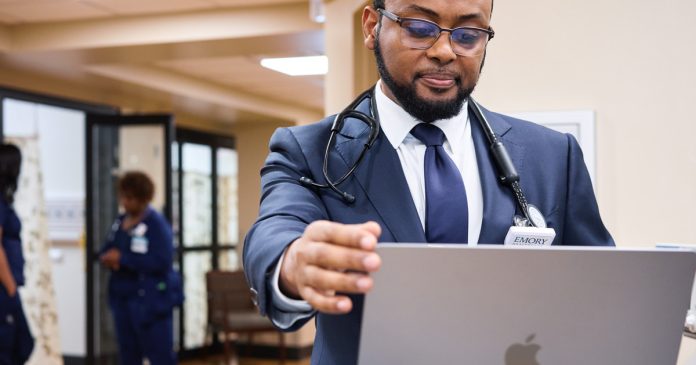At Emory Hillandale Hospital in Lithonia, Georgia, a major transformation is taking place in healthcare delivery, integrating Apple’s suite of products with Epic healthcare apps. This forward-thinking initiative not only redefines patient care but also reimagines the clinician experience, providing a glimpse into a tech-savvy future for small businesses in healthcare.
Ravi I. Thadhani, MD, MPH, executive vice president for health affairs at Emory University, emphasized the significance of this technological shift, stating, “We’re not just changing technology; we’re changing a culture.” By equipping the hospital with devices like Mac, iPhone, iPad, and Apple Watch, Emory Healthcare aims to boost efficiency and connectivity among its clinicians, leading to improved patient outcomes.
Key benefits of this integration are manifold. The introduction of Mac computers in nursing stations and the replacement of legacy devices have markedly enhanced workflows. Clinicians can now access patient-specific information in real time, utilizing an iPad that magnetically attaches to the wall outside patient rooms. This allows care teams to communicate seamlessly, improving coordination around patient care.
Dr. Vikram Narayan, a urologic oncologist at Emory Healthcare, articulated a pressing concern in the healthcare industry: the increasing burnout rates among frontline workers due to administrative burdens and staff shortages. By leveraging Apple technology, Emory is setting a precedent for alleviating these stressors and enabling clinicians to focus more on patient care, as illustrated by Dr. Narayan’s findings that integration with Epic and ambient documentation can save up to two hours of daily administrative work.
The user-friendly nature of Apple products has led to significant improvements in care team satisfaction. In a previous pilot program at Emory Saint Joseph’s Hospital, clinicians reported faster login times and easier documentation processes, which can be especially vital for small healthcare businesses aiming to enhance employee retention and satisfaction.
Furthermore, the integration of the MyChart Bedside app provides patients with easy access to their health information via iPads stationed at each bed. This empowers patients to take more active roles in their healthcare, from managing care plans to ordering meals. As Edna Brisco, vice president of patient care services at Emory Hillandale Hospital, noted, “Mac lets the nurses move through their day more swiftly, while iPad brings important health information to our patients’ fingertips. It’s a game changer for how we provide care.”
However, as healthcare businesses consider similar tech upgrades, they must remain acutely aware of potential challenges, especially regarding data privacy and cybersecurity. With the healthcare sector facing increasing cyber threats, ensuring that patient data remains secure is crucial. Apple’s products are designed with robust privacy measures in place, addressing one of the most significant concerns for any healthcare provider.
The partnership between Emory Healthcare and Apple also signals an ongoing commitment to innovation in patient care. As clinicians explore new technologies—such as Apple Vision Pro to aid in surgical planning—the future appears bright. “I think this is the future of healthcare, and as healthcare providers, we should always be looking toward the horizon,” stated Dr. Rashida La Barrie, hospitalist and medical director at Emory Hillandale Hospital.
For small healthcare businesses eager to implement similar technologies, the lesson here is clear: the integration of intuitive, efficient technology can not only alleviate burnout and optimize workflows but also create a more engaged patient experience. Upscaling technology in your practice can lead to improved satisfaction rates and better outcomes, establishing a culture of innovation.
As more healthcare facilities explore digital solutions to enhance their operations, Emory’s transition provides a roadmap for small businesses looking to harness technology to better serve patients. By embracing such innovations, they may find a significant opportunity to redefine their care delivery models, ultimately transforming the patient experience and their overall business landscape.
The developments at Emory Healthcare highlight not just a technological shift but a broader cultural change that could inspire other small businesses in various sectors to evaluate how technology can serve their operational needs. For more detailed insights, visit the original news release on Apple’s website here.
Image Via Apple



